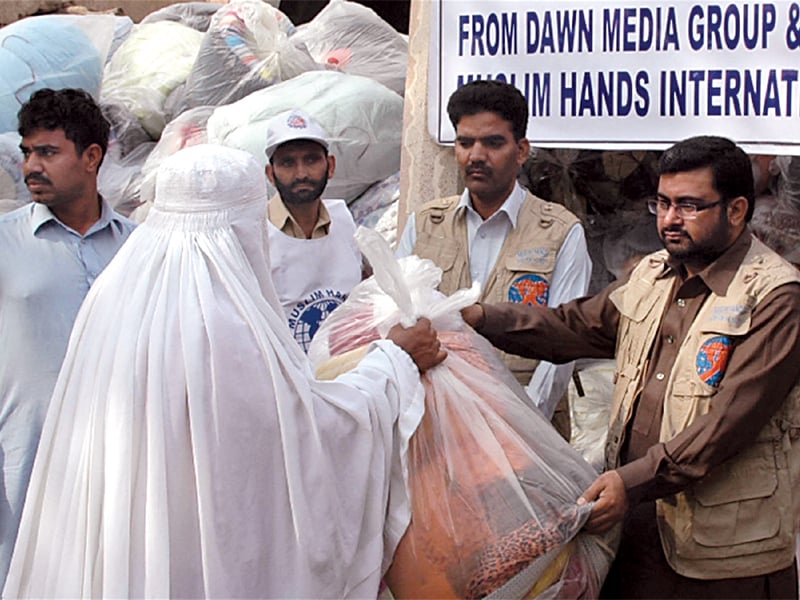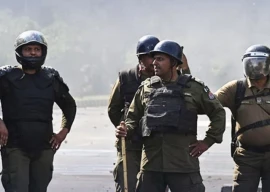
Delivery of humanitarian aid in Khyber-Pakhtunkhwa (K-P) and the Federally Administered Tribal Areas (Fata) has recently been hampered by attacks on schools, aid workers and polio vaccination teams, and bureaucratic procedures for aid projects are making matters worse.
International and national humanitarian agencies in K-P and the Fata often face long delays waiting for local officials to grant the relevant permits.
Since 2005, procedures to obtain no objection certificates (NOCs) for projects and travel have made it more difficult to deliver vital aid.
“We had applied for a project implementation NOC to begin a project in livestock in the Kurram Agency to the Fata Disaster Management Authority in February, and had planned the project in December last year, but have still had no response,” said Anwar Shah, CEO of the Peshawar-based NGO Shid, which works in livestock, livelihood and education.
“Now the local livestock authorities in Kurram say it is too late to start — so everyone suffers.”

Hearing reports of delays, the UN Office for the Coordination of Humanitarian Affairs (OCHA) set about getting a more comprehensive picture by gathering data from agencies operating in the area.
“The problem is not a new one. It has been there for some time, but now rather than just anecdotal accounts, we are trying to properly monitor the situation and create a database to engage the authorities on this issue based on evidence,” Christina Alfirev, OCHA humanitarian affairs officer in Islamabad, told IRIN.
Of the 18 humanitarian agencies who submitted data on NOC project requests in January and February, related to 27 projects, 21 were still being processed; only five had been approved and one had been rejected without explanation, as of early March.
The paper trail
Humanitarian projects in K-P need an NOC from the Provincial Disaster Management Authority (PDMA), and must be requested at least six weeks in advance.
Expatriate staff also need an NOC for travel, and in February the Home Department in K-P said applications should be made “at least 6-8 weeks prior to the visit”, something one international humanitarian worker, who asked not to be named, told IRIN that if implemented, “means regular visits to projects are nearly impossible.”
“A key reason for the new procedures is security concerns. The government is worried a foreign worker or local NGO worker may be harmed, and this brings it a bad name. I think recent events like attacks on polio workers are a factor in the decisions taken,” said a PDMA official in K-P who preferred anonymity because he was not authorized to speak with the press.
The delays witnessed by agencies in the last few months are also affecting relations with donors, some of whom do not transfer funds until project NOCs have been issued.
“The project NOC is valid for six months. Then the same game starts again. At this time I have been waiting now more than six weeks for the extension of an NOC,” said the aid worker, adding that donors usually extend a project’s lifespan, though without increasing budgets, which means they are almost inevitably reduced in size, something donors do not always understand.
“Right now one of our donors is very unhappy,” he said.
Permit mission creep
Officials said that project implementation permits date back to the 2005 earthquake when the procedure was put in place by the Earthquake Reconstruction and Rehabilitation Authority, which intended to coordinate the many agencies working in the quake zone and prevent duplication.
Humanitarian agencies are hoping the new time-scale will be officially reduced to the previous five to seven working days, and as yet it does not seem the 6-8 week policy is being applied on the ground.
“Since 2008, the humanitarian community has raised US$1.38 billion in funding for people affected by violence in K-P and Fata. In order to ensure that the assistance is delivered to the people in need, we depend on the government to facilitate humanitarian operations and ease bureaucratic hurdles,” said Lynn Hastings, OCHA country director.
Aid workers say the delays are making it more difficult to deliver aid to K-P and Fata.
Published in The Express Tribune, April 29th, 2013.























COMMENTS
Comments are moderated and generally will be posted if they are on-topic and not abusive.
For more information, please see our Comments FAQ